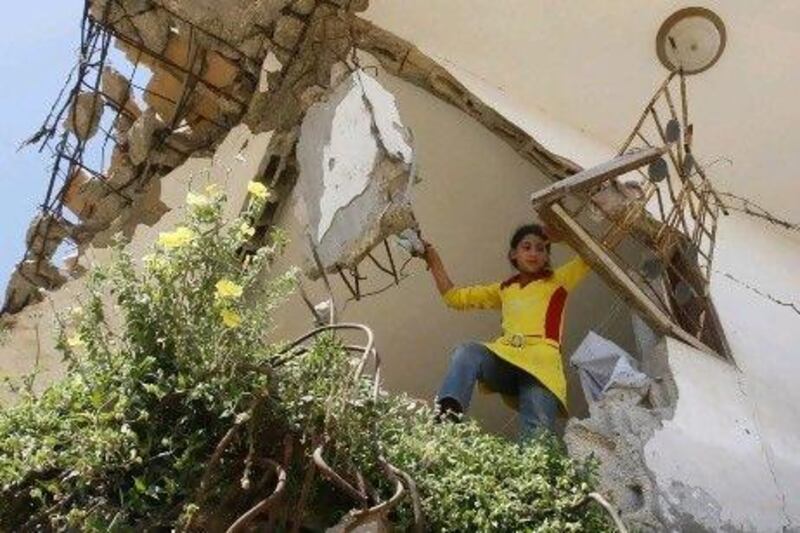GAZA CITY // The Qatari emir is to make an official visit to the Gaza Strip this week, in a move analysts say is to strengthen the country's influence with Arab Islamists and reward Hamas rulers for breaking ties with the Syrian president, Bashar Al Assad.
Sheikh Hamad bin Khalifa Al Thani would be the first Arab head of state to officially visit Gaza since the Palestinian Islamist group wrested control in 2007.
Hamas leaders hope his presence will provide a boost to its legitimacy after years of crippling Israeli blockade and diplomatic isolation by much of the international community.
The visit will be of concern to Israel, which considers Hamas a terrorist organisation and mortal enemy, and could further undermine discreet Israeli-Qatari diplomatic relations that have been strained in recent years.
"We are hoping such visits will encourage more by leaders in the international community and, because of it, finally end the siege" by Israel, said Mahmoud Zahar, a founding stalwart of Hamas.
Mr Zahar did not have details of the visit, but the Gaza-based Al Kitab satellite channel reported on Sunday that Sheikh Hamad's wife, Sheikha Mouza, would accompany him to Gaza this week.
Zakaria Al Qaq, a professor of security studies at Al Quds University in Jerusalem, said the visit was also a setback for the credibility of Hamas's Fatah rivals in the West Bank, who run the Palestinian Authority.
Hamas wrested control of Gaza from Fatah five years ago, and the two have unable to reconcile their bitter division since.
"This is a blow to Abu Mazen and his platform," Prof Al Qaq said, using the nickname of Mahmoud Abbas, the Palestinian Authority president and head of Fatah.
Fatah believes in negotiating peace with Israel, while Hamas officially calls for its destruction.
Mr Al Qaq also called it a "reward" for Hamas's decision last year to close its office in Damascus because of the Syrian government's brutal suppression of the uprising that began in March last year.
"It's obvious that Qatar is trying to be a major player in the region and is trying to reward Hamas for disengaging itself from Syria," he added.
That reward came last month when Doha announced it had opened its first diplomatic office in the Palestinian enclave and at least US$450 million (Dh1.65 billion) for building roads, bridges and thousands of homes, including 1,000 housing units in a development named Hamad City.
Gaza needs about 3,500 homes because of Israel's devastating three-week war that began in December 2008 and killed as many as 1,400 Palestinians.
"God willing, this will help Gaza become normal again," said Mohammed Amasse, 21, manager of a dry-cleaning store in Gaza City. "We thank Qatar because, believe me, our lives have become hopeless, hopeless, hopeless."
Qatar, which maintains strong links with Muslim Brotherhood affiliates such as Hamas, seems to have surpassed Egypt as the territory's most significant Arab benefactor.
Despite the democratic rise of fellow Islamists in Tunisia and especially Egypt, Hamas has complained that Cairo has done little to help it emerge from isolation.
Israeli leaders have not commented on the coming visit by Sheikh Hamad.
Although the Arab world refuses to recognise Israel's existence because of its treatment of the Palestinians, Qatar had maintained relatively durable diplomatic links with Tel Aviv since the early days of the Palestinian-Israeli peace process.
It opened a trade mission in Israel in 1996 and Israeli leaders have visited Qatar. The Israeli trade mission in the Qatari capital was located close to a villa owned there by Hamas's departing leader, Khaled Meshaal.
But Doha severed all diplomatic ties with Israel because of its 2008-2009 war on Gaza, although it has hinted of a possible warming, such as suggesting that Israel could participate in the 2020 World Cup Qatar will host.
Some Palestinians officials say Israel has displayed positive signals towards the Qatari development projects.
Mohammed Husseini, executive manager of the Gaza branch of the Palestinian Contractors Union, said Israeli defence and border officials tentatively gave a nod of approval during a meeting with his group on October 4.
"They said they would not have a problem with these new projects," said Mr Husseini.
A week earlier, the group received a list of 12 new construction-related items that Israel would allow to pass into Gaza that were previously banned.
Mr Husseini's union has been acting as an informal middleman for the projects since Hamas and Qatar refuse to negotiate directly with Israel.
Follow
The National
on
[ @TheNationalUAE ]
& Hugh Naylor on
[ @HughNaylor ]





